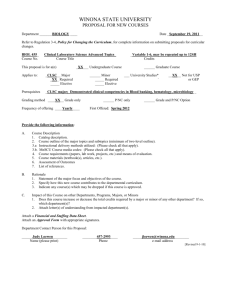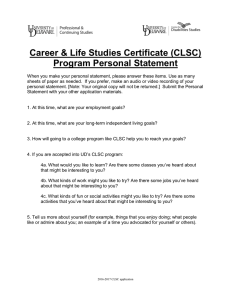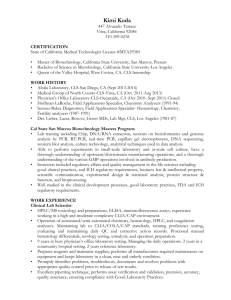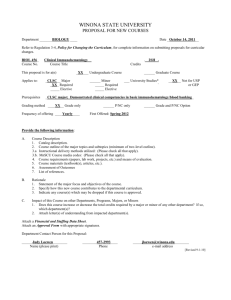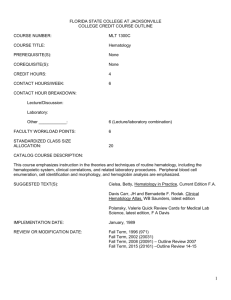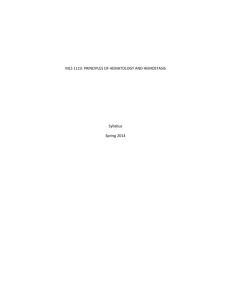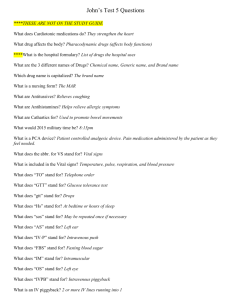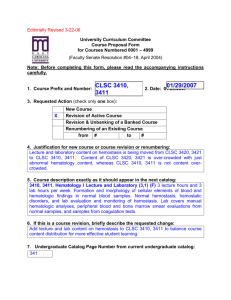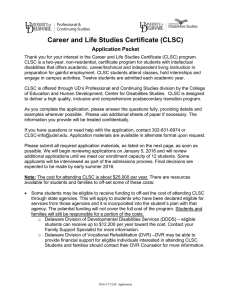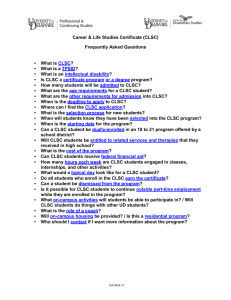BIOL 458 New CPPS - Winona State University
advertisement
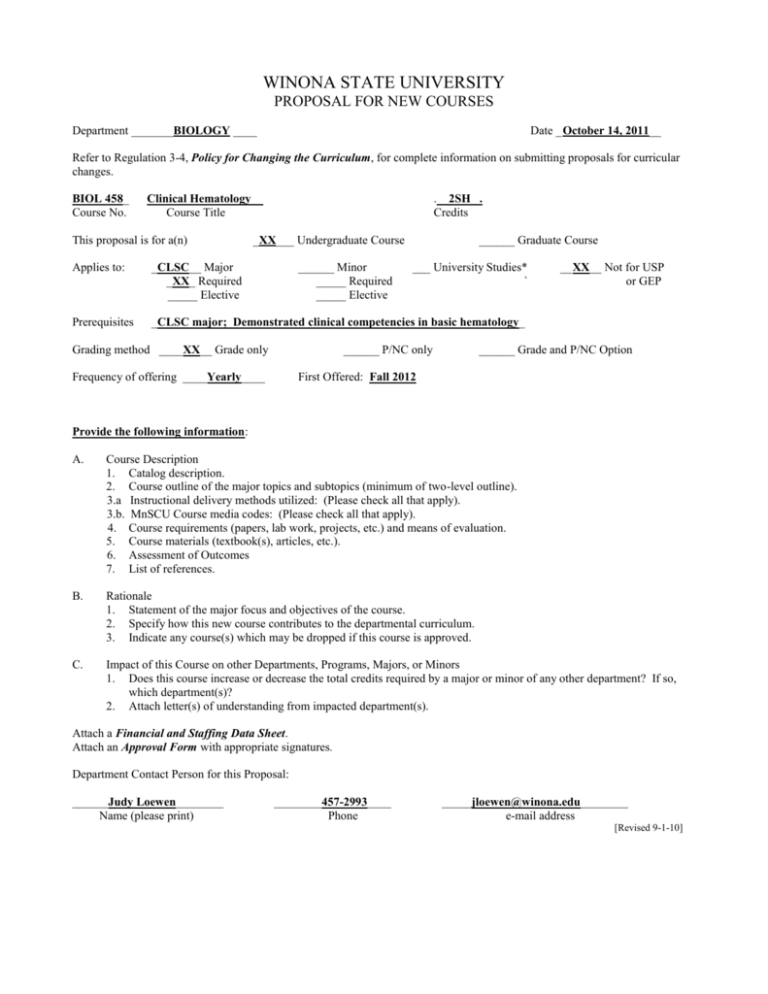
WINONA STATE UNIVERSITY PROPOSAL FOR NEW COURSES Department _______BIOLOGY ____ Date _October 14, 2011__ Refer to Regulation 3-4, Policy for Changing the Curriculum, for complete information on submitting proposals for curricular changes. BIOL 458_ Course No. Clinical Hematology _ Course Title This proposal is for a(n) . 2SH . Credits _XX___ Undergraduate Course ______ Minor _____ Required _____ Elective ______ Graduate Course Applies to: _CLSC__ Major _XX_ Required _____ Elective Prerequisites _CLSC major; Demonstrated clinical competencies in basic hematology_ Grading method ____XX__ Grade only ___ University Studies* ` ______ P/NC only Frequency of offering ____Yearly____ __XX__ Not for USP or GEP ______ Grade and P/NC Option First Offered: Fall 2012 Provide the following information: A. Course Description 1. Catalog description. 2. Course outline of the major topics and subtopics (minimum of two-level outline). 3.a Instructional delivery methods utilized: (Please check all that apply). 3.b. MnSCU Course media codes: (Please check all that apply). 4. Course requirements (papers, lab work, projects, etc.) and means of evaluation. 5. Course materials (textbook(s), articles, etc.). 6. Assessment of Outcomes 7. List of references. B. Rationale 1. Statement of the major focus and objectives of the course. 2. Specify how this new course contributes to the departmental curriculum. 3. Indicate any course(s) which may be dropped if this course is approved. C. Impact of this Course on other Departments, Programs, Majors, or Minors 1. Does this course increase or decrease the total credits required by a major or minor of any other department? If so, which department(s)? 2. Attach letter(s) of understanding from impacted department(s). Attach a Financial and Staffing Data Sheet. Attach an Approval Form with appropriate signatures. Department Contact Person for this Proposal: ______Judy Loewen________ Name (please print) ________457-2993____ Phone _____jloewen@winona.edu________ e-mail address [Revised 9-1-10] A. Course Description 1. Catalog Description: 458- Clinical Hematology (2 SH). An advanced hematology course for students in the Clinical Laboratory Science – Completion program, with a focus on the clinical analysis of blood samples and the identification of blood pathologies. Includes both online learning and on-site laboratory sessions. Prerequisites: Clinical Laboratory Science Completion (CLSC) major with successful clinical competency test completion and instructor’s permission. Letter grade only. Offered yearly. 2. Course Outline of Major Areas of Content: Clinical HematologyI. Orientation to Online Learning a. Welcome to online learning b. How Do I know what to do each week? c. How do I access course content? d. How so I ask questions? e. How do I post a discussions comment? f. How do I deposit a dropbox document g. How do I take a quiz? II. Comprehensive Assignment III. Introduction to hematology a. Routine hematology b. Hematopoietic Organs c. The Leukocytes and their Disorders 1. Leukocyte morphology and physiology 2. Nonmalignant Granulocyte and Monocyte Disorders 3. Nonmalignant Lymphocyte Disorders 4. Myeloproliferative Disorders 5. Myelodysplastic Syndromes 6. Acute Myelogenous Leukemia 7. Acute Lymphocytic Leukemia 8. Lymphoid Malignancies 9. Introduction to Hematopoietic Neoplasms d. Erythrocytes and their Disorders 1. Erythrocyte morphology and physiology 2. Hemoglobin 3. Hemoglobinopathies 4. Introduction to Anemia 5. Hemolytic Anemias 6. Anemias of Disordered Iron Metabolism 7. Thalassemia 8. Megaloblastic and Nonmegaloblastic macrocytic Anemias 9. Hypoproliferative Anemias 10. Bone Marrow IV. Mathematics for the Hematology Lab a. Douchette Text powerpoint b. Hematology Basic Math: Sample problems V. Lab techniques a. Instrumentation b. Pipetting 3 a. Instructional delivery methods utilized: (Please check all that apply). None: Internet Independent Study Satellite ITV Sending Taped CD Rom Broadcast TV ITV Receiving Web Enhanced XX Web Supplemented 3 b. MnSCU Course media codes: (Please check all that apply Lecture: ITV Online XX Auditorium Lecture: Service Learning Travel Study Classroom Other: (Please indicate) Web Enhanced XX Web Supplemented Laboratory XX Internship/Practicum 4. Course Requirements This course will include quizzes, exams, homework assignments, and laboratory exercises. Students must successfully complete all online modules Students must attend all laboratory sessions (typically five times per semester in blocks of four to five hours) and must complete all laboratory exercises including case presentations of peripheral blood and bone marrow smears, identification of both normal and abnormal cells in peripheral blood, and identification of both normal and abnormal cells in bone marrow smears Students must complete all online assignments and all homework assignments using the D2L drop box format which allows for instructor feedback and communication. Students must successfully pass all quizzes and exams. 5. Course Materials: Clinical Laboratory Hematology – Mc Kenzie. 2nd ed., 2010; ISBN # 0-13-019996-6 Clinical Hematology Atlas, Carr, 3rd ed, 2008; ISBN # 978-1-4160-5039-1 Mathematics for the Clinical Laboratory, Doucette, 2nd ed, 2010; ISBN # 978-1-4377-0179-1 Linne and Ringrud’s Clinical Laboratory Science The Basics and Routine Techniques, Turgeon, 6th ed, 2010; ISBN # 978-0-323-06782-9 Principles of Clinical Laboratory Management, Hudson, 2008; ISBN # 0-13-049538-7 Aperio digital slide program inclusive with 300 digital slides for review and observation, and 22 different case presentations for mastery of skills. This includes peripheral blood and bone marrow matching samples per each case presentation with additional test review and cytogenetic components. Guest speakers in areas of expertise. Dr. Lauren Anthony, Pathology Director for clinical labs, Allina Health Group, Abbott Northwestern Hospital. Dr. Rodney Higgins – Clinical Director for cytogenetics, Allina Health Group, Abbott Northwestern Hospital Dr. Steven Wiesner – Associate professor University of Minnesota Twin cities campus 6. Outcomes and Assessment: Students will demonstrate problem solving skills in the area of clinical hematology Students will demonstrate an understanding of laboratory safety Students will demonstrate following skills in a clinical laboratory setting: Laboratory safety Analysis of the number, size, and shape of formed elements of blood Identification of all formed elements of blood Identification of leukocyte abnormalities in peripheral blood and in bone marrow Identification of erythrocyte and hemoglobin abnormalities in peripheral blood Outcomes will be assessed by quizzes for normal reference levels and ranges; exams for knowledge and theory; and observation of problem solving and clinical skills. 7. References: Established levels of practice- ASCP American Society of Clinical Pathologists, National governing body for clinical practices and standards. Students must pass a national board of registry to practice in a clinical laboratory. These standards are published on the website for ASCP. Text Book- ASCP Board of Registry Review, ASCP, ISBN # 0-891894160 National Accrediting Agency for Clinical Laboratory Science (NAACLS) Standards for Accreditation of education programs. www.NAACLS.org B. Rationale 1. Major focus and objectives of the course. This course will be a means for students who are enrolled in the WSU Clinical Lab Science completion program to complete advanced training in theory and techniques of hematology. Although designed primarily for students who have completed a two-year Medical Laboratory Technician (MLT) degree and who have passed their MLT certification exam, students with other two-year (and possibly four-year) degrees and the appropriate clinical lab experience may also be enrolled in the CLSC program. It will provide additional training and advanced education necessary for students to meet the standards for Clinical Laboratory Scientist/Medical Technologist certification 2. Specify how this new course contributes to the departmental curriculum. The Clinical Laboratory Science major, including the CLSC option, has replaced a previous program (Medical Technology, MEDT) for students to be eligible for certification as Clinical Laboratory Scientists/Medical Technologists. One of the major differences was a requirement for students in MEDT to complete a clinical internship at an affiliated site with NAACLS accreditation, whereby WSU will hold its own NAACLS accreditation for students in the CLS programs. This will allow the clinical training and demonstration of skills required by NAACLS to be done within WSU courses such as this one. There are currently two options within the CLS program; a “traditional” course of study (CLS) for students who do not have prior clinical laboratory training and experience, and a bachelor’s degree “completion” option (CLSC) for students who have clinical lab training an experience at the associate degree level. Although it is currently designated only for students in the completion (CLSC) option with on-site laboratories held at St. Paul College, we anticipate that we will eventually be able to integrate this course into the more traditional CLS program as well with laboratories on the WSU campus (and, of course, submission of the appropriate paperwork to A2C2) 3. Course(s) which may be dropped if this course is approved . in the Completion option of Clinical Laboratory Science. None. It is only open to a specific degree track student C. Impact of this course on other departments, programs, majors or minors. 1. Does this course increase or decrease the total credits required by a major or minor of any other department? No. It affects only the CLSC option in the Biology department 2. Attach letter(s) of understanding from impacted department(s). Not applicable WINONA STATE UNIVERSITY FINANCIAL AND STAFFING DATA SHEET Course __Biology 458: Clinical Hematology_ Include a Financial and Staffing Data Sheet with any proposal for a new course, new program, or revised program. Please answer the following questions completely. Provide supporting data. 1. Would this course or program be taught with existing staff or with new or additional staff? If this course would be taught by adjunct faculty, include a rationale. This course will be taught by current faculty. It has been taught for the previous two years under “Individual Problems in Biology” (Biology 400). 2. What impact would approval of this course/program have on current course offerings? Please discuss number of sections of current offerings, dropping of courses, etc. These courses is part of the online Clinical Lab Science degree completion program. CLS, and in particular the online completion option, is the most rapidly growing major within the Biology department and is now our third largest major (of seven), so to some degree this does represent a shift of faculty assignments to meet that increased student demand. We anticipate this shift in student demand will result in the reduction of one section per year of a multiplesection course with lower enrollment such as Biology 104 or Biology 118. 3. What effect would approval of this course/program have on the department supplies? Include date to support expenditures for staffing, equipment, supplies, instructional resources. etc. As noted in #2 above, this course is part of a rapidly growing program to meet changing student demand, so expenditures for equipment, supplies, and other resources will also need to shift toward this course and others in the CLS programs. We anticipate that any additional costs for this course will be covered by increases in the Biology Department’s supply budget due to increased enrollments upon which that budget is calculated.
